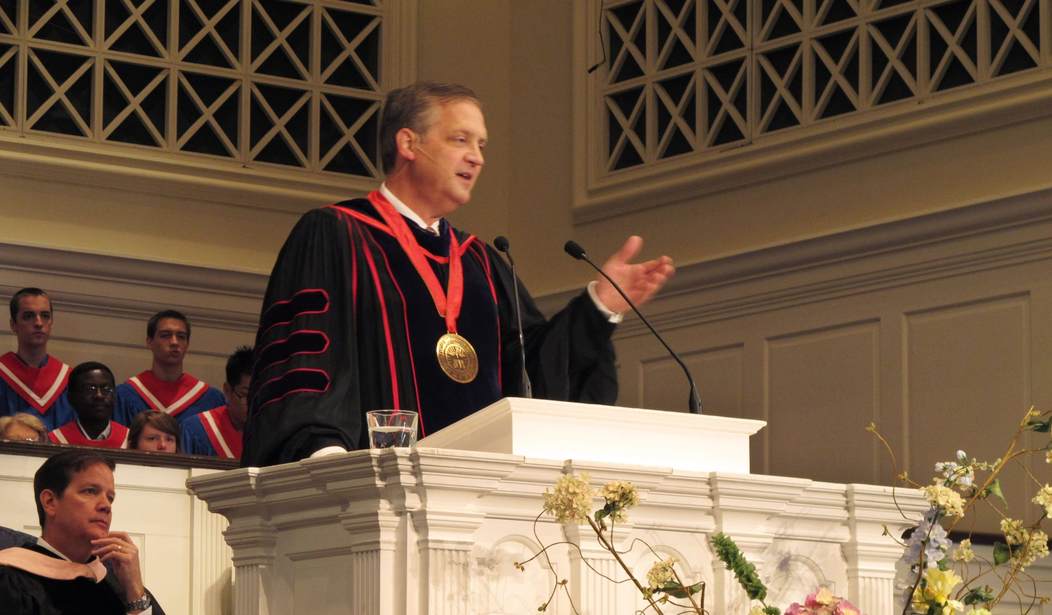Last week, Azusa Pacific University (APU) announced that it had removed language from its student conduct code prohibiting “public LGBTQ+ relationships for students on campus.” The school still claims to uphold biblical sexual morality, but it has relaxed its conduct standards and created a “pilot program to provide a safe space for LGBTQ+ students on campus.”
Evangelical Christian leaders warned that this capitulation could damage religious freedom for other Christian colleges in the future.
“It’s setting a precedent for legal pressure — and worse — on others,” Al Mohler, president of Southern Baptist Theological Seminary (SBTS) told PJ Media on Tuesday.
“The state of California will use APU’s capitulation as a new baseline for Christian colleges,” an anonymous APU staffer told PJ Media. “When Biola [University] or Master’s [College] objects to future legislation curtailing religious liberty, legislators will say, ‘But Look at APU! They’re Christian and they don’t have a problem with homosexuality.'”
APU has the freedom to set its own policies, but this change to the conduct code has tremendous implications for the culture war battles across America. Azusa Pacific did not just allow “public LGBTQ+ relationships,” it did so while claiming to keep defending biblical Christian principles. LGBT organizations could use this example to demand a similar capitulation, weakening religious freedom in the name of “equity.”
Last year, the underground LGBT support group Haven partnered with the LGBT organization Brave Commons to discuss these issues with Azusa Pacific’s administration. “We thought it was unfair to single out queer folks in same-sex romantic relationships while it is impossible to enforce or monitor [whether other students are remaining abstinent],” Erin Green, a recent APU alumna with Brave Commons, told the student paper ZU News.
“Queer students are just as able to have romanticized relationships that abide by APU’s rules. The code used to falsely assume that same-sex romances always involved sexual behavior. This stigmatization causes harm to our community, especially those serious about their Christian faith,” Green argued.
Assistant Dean of Students Bill Fiala, Ph.D., explained the capitulation in terms of “equity,” without suggesting any loss of religious freedom.
“The changes that occured to the handbooks around sexual behavior created one standard for all undergraduate students, as opposed to differential standards for different groups,” Fiala told ZU News. “The change that happened with the code of conduct is still in alignment with our identity as a Christian institution. The language changed, but the spirit didn’t. Our spirit is still a conservative, evangelical perspective on human sexuality.”
In other words, Fiala’s argument is that Christians can maintain their biblical sexual morality while accepting — and perhaps even celebrating — romantic same-sex relationships that come short of sexual activity.
As Mohler explained, the policy suggests that “sexual behavior is the line to draw.” The SBTS president argued that that position is “untenable.” “Azusa Pacific is saying they are glad to have LGBT activists on campus in romantic relationships.”
The discussion of “equity” and having “one standard” for same-sex and opposite-sex couples alike already concedes the fundamental issues. LGBT activists consider sexual orientation and gender identity essential to a person, and argue that any policies against same-sex romance or transgender identity amount to discrimination against people based on unalterable characteristics.
According to the Bible, however, human beings are male and female and the one right setting for romance and sexual activity is marriage. The Bible teaches that human beings have sinful desires and suffer from confusion about their identity, and the answer to these struggles is repentance, forgiveness, and a new identity in Jesus Christ. All people have inherent dignity, and Jesus can free believers from any sin or confusion. Christians should have the religious freedom to live out this vision, while respecting those who disagree.
The LGBT view of identity — which activists use to deny Christians their right to live according to their beliefs in the name of “fighting discrimination” — has already sprung up at APU, in a specifically legal context.
Mohler noted that Christine Guzman, the Title IX coordinator at APU, applied the federal legal protection against sex discrimination to gender identity. “Sex has to do with identity and your gender and with who you are,” Guzman told NPR in March. “So if there’s a student who is feeling discriminated against because of their gender, then, yes, absolutely, I’m going to apply that law.”
If a school violates Title IX, it risks losing federal funding. The money angle may help explain why Azusa Pacific caved so quickly.
“The LGBT change was made with zero faculty or staff input; we literally learned about it for the first time in the student newspaper. We also learned about it after finding out that the university has been overspending its budget by millions for the last five years,” the anonymous Azusa Pacific staffer told PJ Media.
If the school is struggling with debt, that makes it particularly vulnerable. Threats against federal funding and worries about tuition could lead a school to reject its biblical values.
Mohler warned that “a Christian college that becomes dependent upon the tuition of non-Christian students will eventually be a non-Christian college, or Christian in name and heritage only.”
Azusa Pacific is part of the Council for Christian Colleges and Universities (CCCU). CCCU did not respond to PJ Media’s request for comment.
The SBTS president — whose college is not part of the CCCU — warned that Azusa Pacific’s capitulation will reflect on the CCCU.
“This is a clear test for the CCCU as to how it is going to define its membership, because Azusa Pacific University has more or less thrown down the gauntlet,” Mohler declared.
This struggle to maintain biblical truth on sexuality amid financial threats will likely face many other colleges across the country. Azusa Pacific should rethink its approach, lest LGBT activists use APU as an example to force other Christian organizations to sacrifice their biblical convictions.
Follow the author of this article on Twitter at @Tyler2ONeil.









Join the conversation as a VIP Member